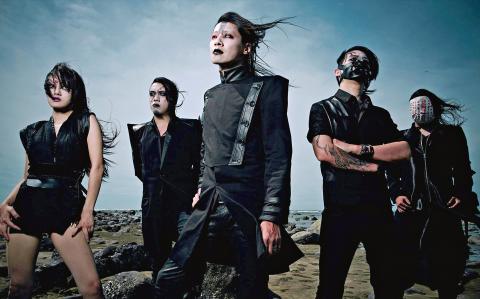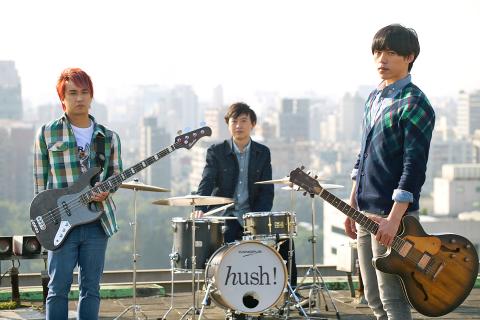“True beauty is something that attacks, overpowers, robs and finally destroys.” So said Japanese writer, nationalist, possible psychotic and seppuku enthusiast Yukio Mishima.
There has been much beauty to witness in Taiwan of late, within the music scene and without. Within the scene, shows witnessed by this writer in recent weeks have had an energy about them previously found lacking — an energy that is perhaps mirrored in society at large.
That uptick in something that, for lack of a better word we’ll call spirit, could have something to do with the political arena.

Photo courtesy of Chthonic
January’s general elections seemed to usher in a sweeping change of the prevailing voice across the country with the resounding victory of Democratic Progressive Party (民主進步黨) presidential candidate Tsai Ing-wen (蔡英文).
Taipei’s fifth district even elected the nation’s first bona fide metal head politician to the Legislature when it chose Chthonic’s (閃靈) Freddy Lim (林昶佐) to represent it over a heavily entrenched incumbent.
All beautiful things. Attacking the ghosts of the past head on, overpowering the old guard, robbing the establishment of the voice it had stolen from the once quietly seething majority, destroying tenets held sacred too long.

Photo courtesy of Re:public Records
This weekend, the celebration of the melding of music and politics will continue at Megaport (大港開唱) in Kaohsiung. The festival, organized by a group headed by Lim, will see over 70 bands take to multiple stages over its two-day run, alongside speaking engagements presided over by Lim and other figures from the political and activist arenas.
Starting out in 2006, the festival has seen its ups and downs, much like the man now heading up the occasion and his band. Now, all seem to be in confluence.
Tomorrow’s highlights will include the aforementioned Chthonic, not least of which for the fact that speculation has run rife that Lim’s political career could see the band’s performance schedule somewhat curtailed over the next four years.
For Lim’s part, he has stated that the band will continue touring, and a new album could see the light of day as soon as next year.
Another band to look out for is Taipei snot-nosed punk/metal protagonists The Roadside Inn. The band’s high-energy live shows and in-house DIY work ethic have quickly elevated the group over and above many of their peers in just a few short years. If you happen to be anywhere near the first three rows, watch out for front man Zoie Liao’s frequent stage dives.
Preeminent Taiwanese Brit/indie rock group 1976 will also return to the stage tomorrow night. The Golden Melody Award-winning band marks its 20th year, passing the two-decade mark no mean feat in a country where the prevailing social constructs and culture eat most bands for breakfast.
Moving to Sunday, fans of the heavy stuff will no doubt be circling the time slot of Taipei melodic thrash band Infernal Chaos. The band has been somewhat quiet in recent years, with only sporadic appearances here and there due to guitarist and founder Jesse Liu’s (劉笙彙) heavy commitments in Chthonic.
With Lim now politically indisposed, perhaps Liu’s other perennial fan favorite will return to a more regular gigging regiment. Expect furious action in the pit for this one.
For something just slightly softer, pop rock band Hush will also take to the stage on Sunday. The band, led by singer/songwriter Hush Chan (陳家偉), attracted the public’s attention in 2013 when the video for their track Lovers In The Sky featured what could well have been the first same-sex love story in Taiwan music industry history.
The song and video played a part in cementing Taiwan as perhaps the most progressive country in Asia when it comes to acceptance of the fact that, hey, some people are straight, some are gay, and we should all just get over it.
Indie rock, art folk and alternative country are all descriptors that have been used to describe another of Sunday’s featured artists, The Tic Tac. Perhaps it’s best that you just take in the performance and decide for yourself what to call their thoughtful and soulful take on the wide-spanning indie genre.
And for another dose of heavy that is itself heavily influenced by the political maelstroms perpetually swirling in and around Taiwan, check out Burning Island (火燒島). The Tainan thrashers mix old-school meets new thrash riffs with a heavy dose of Taiwan pride.
Another fitting addition to a fest coming into its own at a timely moment in the life of the scene, and that of the country at large.
■ Megaport takes place tomorrow and Sunday at Kaohsiung’s Pier-2 Art Center (駁二藝術特區), 1 Dayong Rd, Kaohsiung City (臺灣高雄市鹽埕區大勇路1號). Tickets are NT$1,600 for two days, single day tickets NT$900, both available at 7-Eleven ibon kiosks, or online via Indievox.

Taiwan has next to no political engagement in Myanmar, either with the ruling military junta nor the dozens of armed groups who’ve in the last five years taken over around two-thirds of the nation’s territory in a sprawling, patchwork civil war. But early last month, the leader of one relatively minor Burmese revolutionary faction, General Nerdah Bomya, who is also an alleged war criminal, made a low key visit to Taipei, where he met with a member of President William Lai’s (賴清德) staff, a retired Taiwanese military official and several academics. “I feel like Taiwan is a good example of

March 2 to March 8 Gunfire rang out along the shore of the frontline island of Lieyu (烈嶼) on a foggy afternoon on March 7, 1987. By the time it was over, about 20 unarmed Vietnamese refugees — men, women, elderly and children — were dead. They were hastily buried, followed by decades of silence. Months later, opposition politicians and journalists tried to uncover what had happened, but conflicting accounts only deepened the confusion. One version suggested that government troops had mistakenly killed their own operatives attempting to return home from Vietnam. The military maintained that the

Before the last section of the round-the-island railway was electrified, one old blue train still chugged back and forth between Pingtung County’s Fangliao (枋寮) and Taitung (台東) stations once a day. It was so slow, was so hot (it had no air conditioning) and covered such a short distance, that the low fare still failed to attract many riders. This relic of the past was finally retired when the South Link Line was fully electrified on Dec. 23, 2020. A wave of nostalgia surrounded the termination of the Ordinary Train service, as these train carriages had been in use for decades

Lori Sepich smoked for years and sometimes skipped taking her blood pressure medicine. But she never thought she’d have a heart attack. The possibility “just wasn’t registering with me,” said the 64-year-old from Memphis, Tennessee, who suffered two of them 13 years apart. She’s far from alone. More than 60 million women in the US live with cardiovascular disease, which includes heart disease as well as stroke, heart failure and atrial fibrillation. And despite the myth that heart attacks mostly strike men, women are vulnerable too. Overall in the US, 1 in 5 women dies of cardiovascular disease each year, 37,000 of them